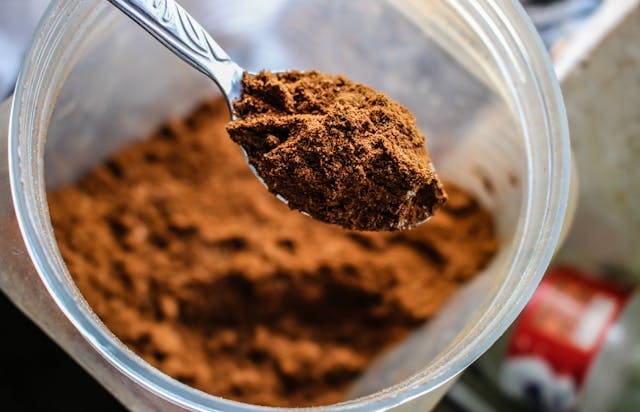With a growing number of people searching for plant-based diets due to health and environmental factors, plant-based protein powders have also gained much popularity. There are many myths surrounding them regarding effectiveness, taste, and nutritional value. This overview debunks these myths, providing accurate information on each one. From the perception that plant proteins lack taste and completeness to the belief that they can’t support muscle development or withstand heat, we’ll explore how modern plant-based protein powders have evolved to meet the needs of a wide range of consumers.
Myth 1: It Doesn’t Taste Good
The perception that plant protein powders do not taste excellent has been carried from early versions, which often presented gritty textures and unpalatable flavors that left an awful taste in the mouth.
The Truth:
However, modern vegan protein powders have undergone significant advancements. They are smooth, easy to mix with milk or water, and available in a variety of delicious flavors that cater to every taste. Innovations in natural flavoring and processing techniques have significantly improved the taste and texture of these products, making them more enjoyable to consume.
Myth 2: Whey Is Superior to Plant-Based Protein
The main reason for this misconception that whey protein is superior is that it is considered a complete protein because it contains all the nine essential amino acids required by the body. On the other hand, people perceive plant-based proteins as incomplete due to their potential lack of one or more of the nine essential amino acids. The perception of this has caused many to believe that only whey is effective in building muscles and consuming proteins.
The Truth:
However, this view overlooks the flexibility and effectiveness of plant-based protein sources. Soy protein is a complete plant-based protein, and by combining multiple plant proteins—such as pea, brown rice, and hemp—one can create a blend that provides a full amino acid profile similar to whey. High-quality plant-based protein powders are designed to utilize these complementary sources, ensuring all essential amino acids are present. This makes them a viable and effective alternative to whey for those looking to support muscle growth and overall health.
Myth 3: ‘Incomplete’ Label on Plant Proteins
The belief that plant proteins are “incomplete” stems from the likelihood that some of their amino acids are low. This gave the impression that plant proteins are not suitable for all the protein needs in a body.
The Truth:
However, a diversely consumed plant-based diet easily meets the body’s requirement of all the essential amino acids that would make one optimally healthy. Plant protein powders can even fill in the amino acid gaps that one might otherwise overlook. Research supports that a well-planned plant-based diet would fulfill the major requirements for dietary proteins.
Myth 4: Ineffective for Muscle Development
The belief that animal protein is the most effective for muscle development leads people to the misconception that plant-based proteins are ineffective. This has led many people to assume that plant proteins cannot deliver the necessary nutrients for muscle growth.
The Truth:
However, several studies have shown that plant-based proteins, such as pea protein isolate, can work just as well as whey in supporting muscle development when used in conjunction with resistance training. For instance, studies show that pea protein can enhance the thickness of muscles and strength similar to that of whey. Moreover, plant proteins have leucine, which is a crucial amino acid for the growth of muscles. Many top athletes and bodybuilders have adopted plant-based protein powders successfully, and the outcomes are fantastic, showing that plant proteins can be a useful and efficient source for the development of muscles.
Myth 5: Not Enough Calcium Leads to Weak Bones
Most plant-based diets are believed to provide much less calcium, which further leads to weak bones or osteoporosis. Again, the reason behind the misconception lies in the people’s limited knowledge about how calcium accumulates in plant foods or the widespread misconception that people would get it mainly from animal foods.
The Truth:
However, plant-based diets can easily meet the requirements for calcium. Rich sources of calcium include leafy greens such as kale, broccoli, and bok choy, along with seeds such as chia and sesame. Moreover, a few minutes of direct sunlight per day is enough to keep your body producing enough vitamin D, which is a crucial element for bone health. Regular exercise also helps build stronger bones by increasing bone density and reducing the risk of osteoporosis, making plant-based diets a viable option to maintain strong and healthy bones.
Myth 6: Heavy On The Gut
The misconception that plant proteins are harder to digest compared to animal proteins stems from the belief that plant-based diets are more taxing on the digestive system.
The Truth:
On the other hand, plant proteins, such as peas and brown rice, are gentle on digestion and are a better alternative for people with lactose intolerance. Studies show that animal proteins may produce excess metabolites that damage gut health. Plant proteins, on the other hand, actually facilitate digestion. They contain fewer irritants and are easier to process; thus, they are ideal for gut health and well-being.
Myth 7: It Can’t Handle the Heat
The misconception that heat alters the nutritional value of protein powder comes from the idea that it can be easily destroyed during cooking, similar to eggs or meat.
The Truth:
However, it is just like any other source of protein and does not lose its nutrient value. It can even be quite a useful supplement for baking, adding some protein and not affecting taste or quality. Plant-based protein powders have the advantage of being highly flexible and can be added quite easily to various recipes, which explains why they have become an attractive option for all protein-enhanced snacks and meals.
The New Jersey Digest is a new jersey magazine that has chronicled daily life in the Garden State for over 10 years.
- Staffhttps://thedigestonline.com/author/thedigeststaff/
- Staffhttps://thedigestonline.com/author/thedigeststaff/
- Staffhttps://thedigestonline.com/author/thedigeststaff/
- Staffhttps://thedigestonline.com/author/thedigeststaff/


